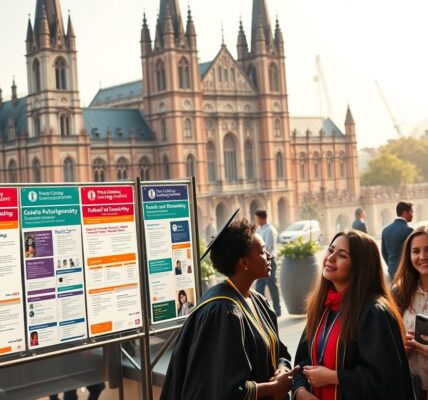Charting Your Path: Essential Tips for Securing Athletic Scholarships in the United States
For many Nigerian students, pursuing higher education in the United States is a dream. One way to make this dream a reality is through sports scholarships. These opportunities provide financial aid based on athletic performance, helping students focus on both their education and their sport.
The NCAA plays a key role in regulating these programs. Schools in NCAA Division 1 and Division 2 award over $3.6 billion annually to talented athletes. However, competition is fierce, with only 2% of high school athletes receiving such support.
It’s important to understand the difference between full and partial scholarships. Division 1 schools often offer full scholarships, while Division 2 schools may provide partial aid. Early preparation is crucial for Nigerian students aiming to stand out in this competitive landscape.
1. Understanding Athletic Scholarships
Sports-based funding is a pathway for Nigerian students to study in the U.S. These programs provide financial aid to talented athletes, helping them balance academics and sports. Understanding the different types of aid and eligibility criteria is essential for success.
What Are Sports-Based Funding Programs?
These programs offer financial support to students who excel in sports. They are awarded by colleges and organizations like the NCAA, NAIA, and NJCAA. The aid can cover tuition, housing, and other expenses, making education more accessible.
Types of Financial Aid
Financial aid can be full or partial. Full aid covers all expenses, while partial aid provides a portion of the costs. The type of aid depends on the college division and the student’s athletic performance.
Eligibility Criteria
To qualify, students must meet academic and athletic standards. For example, NCAA Division 1 requires a minimum GPA of 2.3. Additionally, students must complete 14 core courses to be eligible. International students, including Nigerians, must also meet specific requirements.
| Organization | Scholarship Type | Key Requirements |
|---|---|---|
| NCAA Division 1 | Full or Partial | 2.3 GPA, 14 core courses |
| NAIA | Full or Partial | Flexible, no GPA restrictions |
| NJCAA | Partial | Two-year community college |
Understanding these programs and their requirements is the first step toward securing financial aid. Nigerian students should focus on both their academic and athletic performance to increase their chances of success.
2. Start Early: The Importance of Preparation
Early preparation is the cornerstone of success for Nigerian students aiming to study in the U.S. through sports. Starting in high school allows students to develop their skills, build a strong resume, and meet eligibility requirements. The earlier they begin, the better their chances of standing out to recruiters.
High School Athletic Performance
High school is the ideal time to focus on sports specialization. By age 14, students should identify their strengths and commit to improving their performance. Joining elite clubs like Lagos City FC can provide exposure to competitive environments and enhance their skills.
Tracking competition records and statistics is crucial. These details showcase a student’s progress and potential to college coaches. Additionally, maintaining a balance between academics and sports is vital, especially for Nigerian IB students.
Building a Strong Athletic Resume
Creating a standout resume requires careful planning. By junior year, students should compile video highlight reels that showcase their best performances. These reels are often the first impression coaches have of an athlete.
Participating in summer showcases and travel teams increases visibility by 40%. These events provide opportunities to compete against top talent and catch the attention of recruiters. The NCAA’s sliding scale for test scores and GPA also emphasizes the importance of academic excellence.
- Start sports specialization by age 14.
- Track competition records and statistics.
- Create video highlight reels by junior year.
- Join elite clubs like Lagos City FC.
- Participate in summer showcases and travel teams.
3. Academic Excellence: A Key Component
Academic performance plays a vital role in securing opportunities for Nigerian students in the U.S. Colleges look for well-rounded individuals who excel both on the field and in the classroom. A strong GPA and meeting core course requirements are essential steps in this process.
Maintaining a Strong GPA
Colleges prioritize students with high GPAs. The NCAA requires a minimum GPA of 2.3 for Division 1 eligibility, but aiming higher increases chances of acceptance. Nigerian students should focus on their WAEC/NECO results, as these are converted to meet NCAA standards.
For students struggling with grades, improvement programs are available. These programs help athletes meet academic requirements while continuing to train. Balancing sports and studies is challenging, but with proper planning, it’s achievable.
Core Course Requirements
The NCAA mandates 16 core courses, including 4 years of English and 3 years of math. Nigerian students must ensure their curriculum aligns with these requirements. SAT or ACT scores are also crucial for Division 1 and 2 eligibility.
Online SAT prep resources are available for African students. These tools help students prepare effectively and improve their scores. A strong academic profile can also open doors to additional financial aid opportunities.
| Requirement | Details |
|---|---|
| GPA | Minimum 2.3 for NCAA Division 1 |
| Core Courses | 16 courses, including 4 English/3 math |
| Test Scores | SAT/ACT required for Division 1/2 |
Admissions teams often review social media profiles. Students should maintain a professional online presence to avoid any negative impressions. Combining academic and athletic achievements can significantly enhance a student’s application.
- Focus on maintaining a high GPA.
- Align WAEC/NECO results with NCAA standards.
- Prepare for SAT/ACT using online resources.
- Meet core course requirements for eligibility.
- Improve grades through dedicated programs.
4. Choosing the Right NCAA Division
Selecting the right NCAA division is a critical step for Nigerian athletes aiming to study in the U.S. Each division offers unique opportunities and challenges, making it essential to understand the differences. Whether it’s the intense competition of Division I or the balanced approach of Division III, finding the best fit can shape a student’s college experience.
Division I vs. Division II vs. Division III
Division I is known for its high level of competition and extensive resources. Schools in this division often offer full scholarships, especially for popular sports like football and basketball. For example, FBS football programs allow up to 85 full scholarships, while FCS programs offer 63.
Division II provides a balance between athletics and academics. While scholarships are available, they are often partial. This division is ideal for athletes who want to compete at a high level while focusing on their studies.
Division III does not offer athletic scholarships, but it emphasizes academic excellence and personal growth. Schools like MIT fall into this category, making it a great choice for students prioritizing education over sports funding.
Finding the Best Fit for Your Skills
To choose the right division, Nigerian athletes should assess their skills, goals, and priorities. Here are some factors to consider:
- Practice Time Commitments: Division I requires more practice hours, while Division III offers a more flexible schedule.
- Scholarship Availability: Some sports, like tennis, have limited scholarships compared to basketball or football.
- Academic Support: Division I programs often provide robust academic support systems for athletes.
- Self-Assessment Tools: Online tools can help athletes evaluate which division aligns with their abilities.
- HBCU Opportunities: Historically Black Colleges and Universities (HBCUs) offer unique pathways for Nigerian students.
- JUCO Pathway: Junior colleges (JUCOs) can serve as a stepping stone to Division I programs.
| Division | Scholarships | Practice Hours | Academic Focus |
|---|---|---|---|
| Division I | Full or Partial | High | Moderate |
| Division II | Partial | Moderate | Balanced |
| Division III | None | Low | High |
By carefully evaluating these factors, Nigerian athletes can make informed decisions about their college journey. Success stories from athletes in each division highlight the diverse opportunities available. Choosing the right level ensures a fulfilling experience both on and off the field.
5. Networking with Coaches and Recruiters
Building strong connections with coaches and recruiters is a crucial step for Nigerian athletes aiming to study in the U.S. Effective communication and showcasing talent can open doors to opportunities. This process requires strategy, preparation, and understanding of NCAA rules.
How to Contact College Coaches
Initiating contact with coaches is often the first step. Studies show that 73% of Division I recruits make the first move. A well-crafted introductory email can make a lasting impression. Here’s a template to get started:
- Subject Line: Clear and concise, e.g., “Prospective Athlete: [Your Name] – [Your Sport].”
- Introduction: Briefly introduce yourself, your sport, and your achievements.
- Attachments: Include a resume and link to your highlight reel.
- Call to Action: Request a follow-up call or meeting.
Timing is also important. For international calls, early mornings or late evenings (U.S. time) are optimal. Avoid third-party recruiters, as scams are common in Africa. Always verify the legitimacy of the recruiter.
Creating a Highlight Reel
A highlight reel is a powerful tool to showcase your skills. Reels under three minutes receive twice as many views. Focus on quality over quantity. Here’s what to include:
- Essential Clips: For soccer, show goals, assists, and defensive plays. For basketball, highlight scoring, assists, and rebounds.
- Editing Software: Use tools like DaVinci Resolve or Adobe Premiere Pro, which are accessible and user-friendly.
- Professional Touch: Add your name, position, and contact information at the beginning and end.
Cultural differences in recruitment etiquette should also be considered. U.S. coaches value confidence and clarity. Be professional but genuine in your communication.
Finally, ensure compliance with NCAA rules. International athletes must follow specific guidelines when communicating with coaches. Familiarize yourself with these rules to avoid disqualification.
6. Participating in Camps and Showcases
Attending sports camps and showcases can significantly boost a student’s chances of being noticed by recruiters. These events provide a platform for athletes to demonstrate their skills and connect with college coaches. For Nigerian students, they are an essential step toward securing opportunities in the U.S.
Benefits of Attending Sports Camps
Sports camps offer athletes the chance to train at a higher level and gain exposure. Many Division I recruits attend these camps, with 85% of football players participating in summer programs. Camps like Nike Academy host scouts who actively seek African talent, making them ideal for Nigerian students.
Physique training before attending a camp can enhance performance. Additionally, virtual camp alternatives are available for students unable to travel. These online programs provide flexibility while still offering valuable coaching and feedback.
Showcasing Your Talent
Showcases are another excellent way to gain visibility. Events like the IMG Academy camp have led to scholarship offers for participants. Nigerian athletes should research U.S. camps that accept international students and compare costs with European events.
Visa requirements for attending sports camps should also be considered. Proper preparation ensures a smooth experience. Success stories, like Lagos-born athletes excelling at ESPN camps, highlight the potential of these opportunities.
- List U.S. camps accepting international athletes.
- Compare costs of U.S. vs. European showcase events.
- Explore virtual camp alternatives for Nigerian students.
- Prepare for visa requirements and physique training.
- Highlight success stories from Nigerian athletes.
7. Understanding the Recruitment Process
Navigating the recruitment process is essential for Nigerian athletes aiming to study in the U.S. This phase involves understanding NCAA rules, signing the National Letter of Intent (NLI), and meeting deadlines. Proper preparation can significantly enhance a student’s chances of securing financial aid.
NCAA Recruitment Rules
The NCAA has specific rules that athletes must follow during recruitment. For Nigerian students, registering with the NCAA Clearinghouse is the first step. This process ensures eligibility by verifying academic and athletic credentials.
Early signing periods, such as November for basketball or April for football, increase scholarship chances by 30%. Athletes should also be aware of agent restrictions. Amateur athletes are prohibited from signing with agents, as it can lead to disqualification.
“Understanding NCAA rules is crucial for athletes to avoid violations that could jeopardize their eligibility.”
National Letter of Intent (NLI)
The NLI is a binding agreement between an athlete and a college. Signing this document commits the student to attend the institution for one academic year. Key points to consider include:
- Signing Dates: Vary by sport, with early periods offering advantages.
- Contractual Obligations: Athletes must fulfill academic and athletic commitments.
- Violation Consequences: Breaking the NLI can result in penalties, such as losing eligibility.
| Recruitment Phase | Key Details |
|---|---|
| Early Signing | Increases scholarship chances by 30% |
| Regular Decision | Offers flexibility but less financial aid certainty |
| Deadlines | 2025-2026 cycles have specific dates for each sport |
Financial aid package negotiation is another critical aspect. Athletes should discuss terms with coaches to ensure the offer meets their needs. Case studies of NLI violations highlight the importance of adhering to rules and understanding contractual obligations.
8. Financial Aid and Scholarship Packages
Navigating scholarship packages can make a significant difference in funding education abroad. For Nigerian students, understanding the financial aid process is crucial to securing long-term support. Combining athletic and academic aid can maximize opportunities and reduce the burden of tuition fees.
Combining Athletic and Academic Scholarships
Many students qualify for both athletic and academic scholarships. For example, 63% of Division I athletes receive partial aid, while academic scholarships can cover 25-100% of costs. Combining these options can significantly reduce the total cost of attendance.
Here’s how to calculate the total cost for Nigerian students:
- Tuition and fees
- Housing and meals
- Books and supplies
- Transportation and personal expenses
FAFSA requirements for international students should also be considered. While FAFSA is primarily for U.S. citizens, some schools use it to assess financial need for international applicants.
Understanding Scholarship Terms
Scholarship terms vary by school and division. Renewal rates differ between NCAA Division I and NAIA programs. For example, Division I scholarships are often renewed annually, while NAIA programs may require reapplication.
Here’s a breakdown of typical baseball scholarship percentages:
| Division | Percentage Covered |
|---|---|
| Division I | Up to 100% |
| Division II | Partial (50-70%) |
| NAIA | Partial (25-50%) |
Students should also be aware of scholarship taxation in their home country. In some cases, financial aid may be considered taxable income. Additionally, health insurance requirements are often included in scholarship agreements.
“Understanding the terms of your scholarship is essential to avoid unexpected financial challenges.”
Here’s a sample 4-year scholarship agreement outline:
- Annual renewal criteria
- Academic and athletic performance expectations
- Health insurance coverage details
- Tax implications for international students
By carefully reviewing these terms, Nigerian students can make informed decisions and secure their financial future.
9. Leveraging Social Media and Online Presence
In today’s digital age, a strong online presence can open doors for athletes seeking opportunities abroad. With 89% of coaches checking recruits’ profiles, social media has become a critical tool for showcasing talent and connecting with programs. Nigerian athletes can use platforms like Instagram, TikTok, and LinkedIn to build a professional image and attract attention from coaches.
Building a Professional Online Profile
A well-crafted online profile is essential for making a positive impression. Coaches often look for red flags, such as party photos or controversial posts, which can harm an athlete’s chances. Instead, focus on highlighting achievements and skills. For example, Instagram athletic highlights can showcase game-winning moments, while a LinkedIn headline like “Dedicated Athlete | Aspiring College Player” adds professionalism.
Platforms like Hudl, used by over 600,000 college coaches, are also valuable for sharing game footage. Nigerian athletes should ensure their profiles are clean, consistent, and reflective of their dedication to both sports and academics. Profile audit services can help identify areas for improvement and ensure compliance with NCAA guidelines.
Using Social Media to Connect with Coaches
Social media isn’t just for showcasing talent—it’s also a way to build relationships with coaches. Direct messaging (DM) etiquette is crucial. Athletes should introduce themselves professionally, share their highlight reels, and express genuine interest in the program. Avoid overly casual language or excessive follow-ups, as this can come across as unprofessional.
TikTok offers unique opportunities for viral sports content. Short, engaging videos of training routines or game highlights can attract attention from coaches and fans alike. Nigerian athletes should also share success stories to inspire others and demonstrate their potential. By leveraging social media effectively, athletes can gain the support they need to achieve their goals.
- Create Instagram highlights to showcase athletic skills.
- Use TikTok for viral sports content and training videos.
- Follow appropriate DM etiquette when contacting coaches.
- Share Nigerian athlete success stories to inspire others.
- Consider profile audit services for a polished online presence.
10. Seeking Guidance and Support
Securing the right guidance can make all the difference for Nigerian students aiming to study in the U.S. From high school coaches to academic advisors, having a strong support system ensures students are well-prepared for the challenges ahead. With 70% of scholarship recipients using placement services, it’s clear that professional guidance plays a vital role in success.
Working with High School Coaches
High school coaches are often the first point of contact for students exploring opportunities abroad. They can provide valuable insights into the recruitment process and help students improve their skills. Requesting recommendation letters from coaches is a key step, as these letters highlight a student’s dedication and potential.
Students should also seek NCAA-certified advisors in cities like Lagos or Abuja. These professionals understand the requirements and can guide students through the application process. Whether choosing paid or free consulting services, it’s important to evaluate the advisor’s track record and expertise.
Consulting with Academic Advisors
Academic advisors play a crucial role in ensuring students meet eligibility requirements. They help align WAEC/NECO results with NCAA standards and prepare students for SAT/ACT exams. Advisors also assist with core course requirements, ensuring students are on track for eligibility.
Cultural transition workshops are another valuable resource. These programs help Nigerian students adapt to life in the U.S., addressing challenges like language barriers and lifestyle changes. Mental health resources are also available to support students throughout their journey.
- Request recommendation letters from high school coaches.
- Find NCAA-certified advisors in Lagos or Abuja.
- Evaluate paid vs. free consulting services.
- Prepare for cultural transition workshops.
- Access mental health resources for international athletes.
- Understand the scholarship appeal process.
- Join alumni mentorship programs for additional support.
With the right guidance and support, Nigerian students can confidently navigate the path to U.S. education. Programs like U.S. Sports Scholarships, which have placed over 1,000 athletes, demonstrate the power of professional assistance. By leveraging these resources, students can turn their dreams into reality.
11. Conclusion
Securing opportunities for Nigerian students in the U.S. requires a strategic approach and dedication. Starting early, balancing academics and sports, and building strong connections with coaches are essential steps. Programs like Bold.org and U.S. Sports Scholarships can provide valuable support throughout the journey.
Nigerian athletes should focus on creating a standout resume, attending showcases, and leveraging social media to gain visibility. Success stories from Nigerian athletes who have secured athletic scholarships serve as inspiration and proof that hard work pays off.
To stay on track, students should follow a final checklist: complete eligibility requirements, prepare highlight reels, and maintain a professional online presence. Ongoing support during college years ensures a smooth transition and continued success in both education and sports.
With determination and the right resources, Nigerian students can achieve their dreams of studying in the U.S. through sports scholarships. Start today and take the first step toward a brighter future.
FAQ
What are athletic scholarships?
What types of athletic scholarships are available?
What are the eligibility criteria for athletic scholarships?
How important is high school athletic performance?
Why is maintaining a strong GPA important?
What’s the difference between NCAA divisions?
How can students contact college coaches?
What are the benefits of attending sports camps?
What is the National Letter of Intent (NLI)?
Can athletic and academic scholarships be combined?
How can social media help in the recruitment process?
Why is working with high school coaches important?
Published on: 29 de May de 2025





